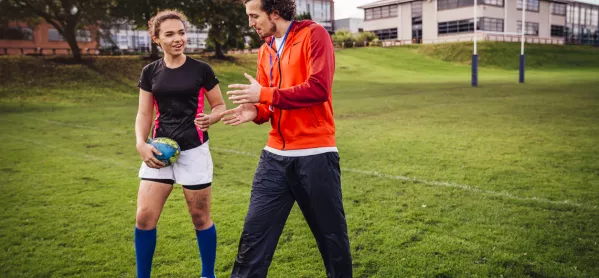- Home
- Two-thirds of adults don’t know pupils’ exercise target
Two-thirds of adults don’t know pupils’ exercise target

A children’s sports charity has revealed that more than two-thirds of UK adults are unaware that children should do 60 minutes of physical activity per day.
In new research published today, carried out by YouGov on behalf of the Youth Sport Trust, 68 per cent of adults either believed the target - based on government guidelines from the chief medical officer - was lower than 60 minutes, or did not know about it.
The data was based on a survey of 2,071 UK adults.
Sexism in school sport: ‘They make fun of girls and stare at our breasts’
News: Schools to challenge ‘social segregation’ via sport
Insight: ‘We can’t allow sports days to be scrapped’
When asked how many minutes of moderate to vigorous physical activity young people should engage in every day, 49 per cent of all adults thought it was less than 60 minutes, and 7 per cent thought it was more. Only 25 per cent correctly said 60 minutes.
The remaining 19 per cent said they did not know.
The average among those who were able to give an answer was 46 minutes.
Only 17.5 per cent of children and young people were currently meeting the government target, according to Sport England’s most recent Active Lives Survey.
The power of sport to ‘improve lives’
The research has been released to coincide with Youth Sport Trust’s National School Sports Week, taking place from 24 to 28 June.
Thousands of schools are taking part in the week, which is themed around “Five Ways to Wellbeing”, focusing on how physical education can improve young people’s mental and physical health.
Speaking to Tes, Youth Sport Trust chief executive Ali Oliver said the charity had “a simple mission to improve children’s lives through the power of sport,” at a time when “young people’s mental and physical health are in decline.”
Commenting on the research, Ms Oliver said it was clear that “parents don’t yet have that awareness of what every child needs,” at a time of rising obesity levels and mental health problems among young people.
Ms Oliver said that one in 10 young people under 16 had a diagnosable mental health condition, while children who were obese could suffer from early onset diabetes, joint problems and cardiac conditions.
She also said sport was important in helping young people to develop empathy and social skills, as “so much of their communication is done through the virtual, not the real.”
The campaign is supported by Ben Smith, the Youth Sport Trust wellbeing ambassador, who ran 401 marathons in 401 days, and is now working towards a USA 2020 challenge, in which he will run a marathon in every US state capital as well as cycling between them, covering 18,500 miles in 104 days. His fundraising through this will support the 401 Foundation and the Youth Sport Trust.
‘PE was scary’
Mr Smith said: “My experience of PE at school was scary. I felt like I wasn’t good enough, like I would never fit in, that I wouldn’t enjoy it and I put so many barriers in place as an excuse not to exercise.”
“Knowing what I know now, this was down to my experience of sport and not having many options to choose from and thinking I needed to be the best. Having found sport later in life, I can now see the power it has to not only build a person’s soul but also the benefits it has on confidence, self-esteem and our overall mental wellbeing. It’s vitally important that every young person has opportunity to enjoy what sport has to offer.”
Ms Oliver said that PE was one of the “first subjects to suffer” when pupils began GCSE exams.
While the government directly invests in primary PE through ring-fenced sport premium funding, research by Youth Sport Trust in 2018 revealed that 38 per cent of secondary schools in England had cut time allocated for PE for 14- to 16-year-olds since the London Olympics in 2012.
Ms Oliver said Youth Sport Trust research showed children from socially disadvantaged backgrounds were less likely to do 60 minutes of physical activity, as were children from black, Asian and minority ethnic (BAME) communities. Only 8 per cent of girls met the target of 60 minutes, compared with 17 per cent of boys.
“We believe there are strong correlations between physical, mental and social health and academic achievement,” she said.
“I find it hard to believe that children’s physical and mental wellbeing is not a fundamental plank for any good school.”
Ms Oliver acknowledged that children may not feel included in PE lessons, and said it was vitally important for the subject to be delivered in a way that is “totally focused on children’s wellbeing.”
“We’re using it to encourage every child to be active, not to select the netball team. It’s not all about finding the next Mo Farah.”
She said given the pressures on young people from digital media and a high-stakes exam system, ensuring young people were mentally healthy was increasingly important.
“There used to be a much greater focus on the teaching of sport, not PE,” she said. “But society has changed, and young people’s lives have changed, so PE has to change.”
Keep reading for just £1 per month
You've reached your limit of free articles this month. Subscribe for £1 per month for three months and get:
- Unlimited access to all Tes magazine content
- Exclusive subscriber-only stories
- Award-winning email newsletters



